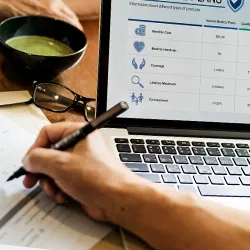If you’ve been involved in a car accident, your insurance company can cover the medical expenses and other damages you encounter.But, what happens if you or the other driver don’t have insurance? Then Personal Injury Protection (PIP) can be a lifesaver. Schmidt & Clark, LLP lawyers have two decades of experience dealing with car accident claims and insurance companies. We’ll use our expertise in dealing with Personal Injury Protection to explain everything you should know about this insurance.
Summary of the Key Findings
- Depending on the state, PIP insurance can be a voluntary or an obligatory add-on to auto insurance.
- PIP is obligatory in 22 US states.
- The insurance company can offer you different levels of PIP coverage, and you can decide how much PIP insurance you want.
What is Personal Injury Protection?

“Personal injury protection (PIP), also known as “no-fault insurance,” is a component of an automobile insurance plan that covers the healthcare expenses associated with a car accident. PIP covers medical expenses for both injured policyholders and passengers, even if some don’t have health insurance.” Investopedia

What PIP Covers

- Medical costs — If medical and surgical treatment bills and medical supplies exceed the limit of your insurance, PIP auto insurance can help pay the difference for you and others listed on your health insurance policy.
- Lost wages — If you can’t go to work while you recover, PIP coverage can cover lost income.
- Rehab — If you need physical rehabilitation, PIP coverage can also include this, as well as ambulance and nursing services and prosthetic devices.
- Household services — If you need help taking care of your home or are a parent who needs help with childcare.
- Funeral expenses and death benefit — PIP can pay for funeral costs if an accident results in death. It can also pay for the death benefit for the family.
What PIP Doesn’t Cover
No-fault insurance doesn’t cover:
- Vehicle damages
- Vehicle theft
- Damage to other people’s property
How to File a PIP Claim

FAQs
What's the difference between PIP and full coverage?
PIP (Personal Injury Protection) specifically covers medical expenses and other related costs for you and your passengers after an accident, regardless of who is at fault. Full coverage, on the other hand, generally refers to a combination of different insurance types—usually including liability, collision, and comprehensive coverage—that protect against a variety of risks, including damage to your vehicle and other people's property, but does not necessarily include PIP.
Does PIP coverage apply if I’m at fault in an accident?
Yes, PIP coverage applies regardless of who is at fault in an accident. This is why it's often referred to as "no-fault" insurance. It ensures that medical and other related costs are covered without the need to determine fault first.
Can I still sue another driver if I have PIP coverage?
In some states, you may be able to sue another driver for additional compensation if your injuries exceed a certain severity threshold or if your damages surpass your PIP coverage limits. The ability to sue depends on state laws and the specifics of the accident.
Do You Need PIP?
PIP insurance covers costs related to an automobile accident. Most importantly, PIP will cover medical bills that exceed your auto insurance limit, so you don’t have to pay them yourself. You can contact your insurance company or a personal injury attorney to check PIP insurance requirements and policy limits in your state. PIP can be a lifesaver if an uninsured driver hits you, so you should get as much PIP coverage as possible. Contact Schmidt & Clark, LLP lawyers for a free consultation, and start the process of acquiring your PIP coverage today.References:1.https://www.iii.org/article/background-on-no-fault-auto-insurance

 Published by
Published by